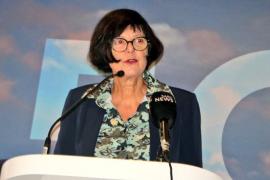
Minister of Forestry, Fisheries and Environmental Affairs, Barbara Creecy, has called for nations to move with speed to reduce carbon emissions to limit the severity of climate change impacts.
“Simultaneously, we have to adapt and build resilience to the impacts that will occur, even in a 1.5 degree world. The Sixth Report of the International Panel on Climate Change shows us that the world is already dangerously close to an average temperature increase of 1.5 degrees above pre-industrial times,” the Minister said on Tuesday.
She was addressing the National Assembly debate on the Climate Change Bill, which will enable the orderly reduction of greenhouse gas emissions through the implementation of sectoral emission targets to guide the journey to the mid -century net- zero commitment.
The Bill will also ensure the country reaches its Nationally Determined Contribution by assigning individual enterprises carbon budgets and facilitating public disclosure of the progress.
“We know climate change impacts will hit the most vulnerable communities first, and will hit them the hardest. A key part of building climate resilience is to set up 'early-warning' systems so that communities can prepare for disasters before they happen,” the Minister said.
According to the Global Commission on Adaptation, knowing that a natural disaster event will happen 24 hours before it occurs can reduce damage by 30 percent.
The Department of Forestry, Fisheries and the Environment and the South African Weather Service (SAWS) currently provide regular weather updates and have technology that can give South African communities advanced warning of extreme weather events.
“Our fundraising efforts aim to improve existing infrastructure and replace outdated and dysfunctional systems. Responding to climate change is not the responsibility of government alone.
“Every aspect of society and the economy will be impacted upon. Consequently, the Bill will formally establish the Presidential Climate Commission as a statutory body to mobilise communities, organised labour, business and civil society to represent a whole of society response to future challenges,” Creecy said.
Last month, African leaders adopted the Nairobi Declaration on Climate Change and Call to Action, which recognises that decarbonising the global economy is an opportunity to contribute to equality and shared prosperity on our continent.
“In support of this vision, President Cyril Ramaphosa, at the United Nations Climate Summit, called on developed countries to meet the need for new, predictable public finance to support climate adaptation and build resilience to loss and damage in developing countries so that no country should ever have to choose between development aspirations and climate action.
“With abundant solar and wind resources, and significant reserves of critical minerals, South Africa is positioning itself to be a leader in renewable energy, green hydrogen and sustainable industrialisation.
“The Just Transition Framework developed by the Presidential Climate Commission aims to ensure that climate actions adhere to principles of procedural, restorative and distributive justice. Consequently as our country develops our vision of a Just Transition to a low carbon economy and climate resilient society we will ensure it is sustainable, inclusive, comprehensive and leaves no one behind,” the Minister said.
The Climate Change Bill will provide impetus for mainstreaming the country’s climate and disaster response by placing a legal obligation on every organ of state to coordinate and harmonise policies, plans, and programmes, to make sure climate change risks and associated vulnerabilities are acted upon by national, provincial and local government.
“Because sub national governments already face financial shortfalls, the Bill provides mechanisms for national government to provide additional support for our climate change response. Already the Department has mobilised finances to assist municipalities to prepare climate response strategies.
“Honourable members, government and society have already achieved a great deal through voluntary co-operation. With this important legal instrument, we are approving today, much more can be achieved for both people and nature,” the Minister said. –SAnews.gov.za


